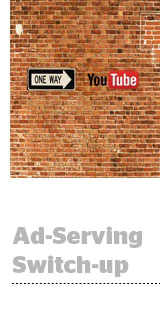
YouTube will no longer support third-party ad serving on reserved buys in Europe beginning May 21, and it will assess whether to extend that policy globally, according to a memo obtained by AdExchanger.
Google advised advertisers who aren’t currently using its ad server DoubleClick Campaign Manager (DCM) to host video on YouTube to “retraffic their ads” by May 21 “to avoid any downtime in delivery,” according to the memo.
Also on that date, a policy that Google revealed in January 2017 to discontinue support for third-party pixel tracking on YouTube will finally come to fruition.
Google claimed in its memo that these policies are all in preparation for the upcoming General Data Protection Regulation (GDPR). Google also stated in the memo that it was evaluating re-certification of certain third-party vendors’ pixels.
A Google spokesperson provided the following statement to AdExchanger: “Last year, we announced that we would be limiting the number of vendors that can measure ads performance on YouTube. Now, as part of our GDPR compliance efforts, we are providing additional information about third-party ad measurement and changes to third-party ad serving.”
But some industry observers believe Google is simply using GDPR to justify cutting support for third-party ad tech providers because DCM will be the only ad server that can serve and track ads on YouTube in the European Economic Area – and potentially in other regions in the future.
YouTube has also historically allowed a portion of its inventory to be served and tracked by an advertiser’s preferred ad servers.
And while Google wouldn’t allow third parties to serve some YouTube inventory like TrueView, third-party ad servers could still track viewing activity using pixels, according to a source who asked to remain anonymous because of their business dealings with Google.
Industry insiders’ fear is that the upcoming YouTube changes eliminate advertisers’ ability to gain insight and control into ad serving, conversions and post-campaign performance, unless they use tools provided by Google.
“Marketers rely on a competitive ecosystem of ad servers, brand safety, viewability and fraud detection vendors to validate the media they purchase across a range of publisher properties,” said Joshua Koran, managing director for Sizmek’s DMP business.
He added: “If Google were to exert its dominance under the guise of GDPR, agencies would be forced to choose solely from among the handful of companies Google pre-selected, which undermines the independence of the services the marketer is trying to buy.”
The new Do Not Track?
Besides the changes outlined in the memo, two sources claim that Google is disallowing third-party pixels or tags to target Google audiences using DoubleClick Bid Manager.
Those sources fear such a move would hinder measurement, as marketers would be forced to more or less rely on Google’s proprietary first-party data.
Some observers claim Google has not fully communicated its explanations for these moves, while others feel Google may be simply advantaging its own ad tech.
“The clear message would have been, ‘We are betting on our proprietary data as the basis for your targeting and measurement and de-prioritizing interoperability because we can’t take translations coming in without risking translations of our data getting out,’” said Adam Heimlich, SVP of programmatic for Horizon Media.
And while third-party ad servers can still technically serve ads into YouTube, they will no longer be able to easily track their performance without a big workaround.
“These changes are being wrapped in the veil of privacy, which just feels disingenuous, because for conversion tracking, you don’t have visibility into specific targeting criteria for that user base,” added John Nardone, CEO of rich media ad server Flashtalking. “If privacy truly was the goal, there are other more straightforward ways to accomplish it without creating this convoluted system which essentially disadvantages everyone in the ecosystem but Google.”
Reliance on Google
To be fair, Google does have a system for marketers who want to track performance on Google properties like YouTube, DoubleClick and Google Display Network: its Ads Data Hub, which works with a bunch of approved measurement providers, including Moat, comScore and Integral Ad Science.
Ads Data Hub uses the cloud-based database BigQuery to pull in data – but that data doesn’t go out. It’s a policy Google has indicated is necessary to ensure user privacy.
But one vendor claimed it was told by Google that it must buy a BigQuery account to essentially get reach and frequency data on the ads it served into YouTube.
Another vendor source agreed, adding that the only way agencies will get the same level of reporting they previously received is through Ads Data Hub.
And using Ads Data Hub requires customers to upload non-YouTube campaign data into Google’s BigQuery in order to access performance data about their campaigns.
“Essentially, pay [Google] for Ads Data Hub to use your preferred partner,” the source said.
This post was syndicated from Ad Exchanger.

More Stories
Creativity shines
Hilton Uses Social Listening to Showcase ‘Superior’ Stays
Spring surge of members for World Out of Home